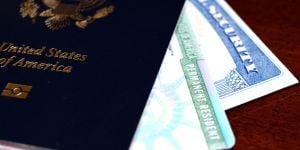
When a family is moving abroad, only one of the adults might have a work visa. That adult is the main applicant, and their spouse or partner is granted a dependent visa. Many countries around the world allow the dependent spouse to work, even if some require an application for a permit or impose restrictions concerning that work. Unfortunately, across Asia and Africa, many countries still do not permit the dependent spouse to work at all.
Most European countries permit working on a spouse dependent visa
Great news for expat couples moving to Europe – the vast majority of European countries will allow the accompanying spouses of expats (on certain visas) to work.
These countries are the United Kingdom, Ireland, Iceland, Norway, Sweden, Finland, Estonia, Latvia, Lithuania, Denmark, the Netherlands, Belgium, Luxembourg, France, Spain, Portugal, Germany, Poland, Czechia, Austria, Switzerland, Italy, Malta, Greece, Russia, Croatia, Bulgaria, Romania, Hungary and Slovakia. Luxembourg has a restriction – while recognized dependents can work, they need to apply for a work permit for an ancillary activity and (if they've been there for less than a year) undergo a labor needs test.
There also exist other restrictions around Europe concerning unmarried partners, same-sex partners and self-employment. For example, dependent spouses in France and Ireland cannot be self-employed; they can only seek traditional employment.
Another restriction in Ireland is that the spouses of intra-company transferees cannot work, for this right is limited to the spouses of expats with a Critical Skills Employment Permit, researchers with a Hosting Agreement, and most doctors. In Russia, only the spouses of expats qualified as highly qualified specialists (HQS) can request permission to work. They also need to meet some conditions, which include having a high school diploma, meeting Russian language requirements and only working in the region where their spouse (the main visa holder) is working.
In the few countries of the EU which haven't legalized same-sex marriage, such as Croatia and Bulgaria, only opposite-sex spouses of expats have the right to work. Same-sex partners will need to get a completely separate work visa. Unfortunately, only a minority of European countries recognize expats' common-law partners (long-term unmarried and unregistered partners who live together) as equal to spouses or registered civil partners. Spain, Portugal, the UK, Ireland, Croatia, the Netherlands, Belgium, Iceland, Norway, Sweden and Finland do give equal work rights to common law partners.
Quite many South American countries allow dependent spouses to work
On the American continent, the following countries allow expats' spouses to work: Canada, the United States, Mexico, Panama, Brazil, Argentina, Chile and Peru. In other countries, such as Colombia, expats' accompanying spouses can study but not work.
In Mexico and Panama, certain conditions apply to expats spouses' ability to work. In Mexico, they must apply for a work authorization after getting a job offer, and in Panama, they must prove to the state that they meet the requirements for any existing and recognized work permit category. Same-sex spouses are recognized in Mexico, Brazil, Argentina and Chile, but unfortunately not in Panama and Peru. Expats' common-law partners are recognized in Mexico, Panama, Brazil, Peru and Chile, but not in Argentina.
In North America, both Canada and the US allow expats' spouses and common-law partners (including same-sex ones) to work, although they need to go through some bureaucratic steps first. In Canada, they need to apply for an open work permit, which is generally granted within 2 months. The United States Citizenship and Immigration Services (USCI) has updated its policy in 2021 so that now, the spouses/partners of expats on visas in the E and L categories can immediately seek employment, including self-employment, without an Employment Authorization Document (EAD). Spouses/partners of expats on H1-B visas still need to apply for an EAD, though.
In the Oceania region, Australia and New Zealand allow expats' spouses and common-law partners (opposite-sex or same-sex) to work. In New Zealand, the spouses/partners of expats who are staying for more than 6 months can apply for a Partner of a Worker Work Visa, which is a permit with open work rights (i.e., which allows them to seek work in any field or be self-employed). It's easier to obtain this permit if the main visa holder in the couple has a Green List role (i.e., job on the government's list of hard-to-fill positions) and earns at least twice the median wage.
In Australia, the dependent spouses/partners of expats on various visas have direct access to work, including self-employment. The eligible visas are the Temporary Skills Shortage (subclass 482), the Skilled Employer Sponsored Regional (Provisional) visa (subclass 494), the Skilled Regional (Provisional) visa (subclass 489), the Skilled Work Regional (Provisional) visa – Main Applicant (subclass 491), the Training visa (subclass 407), the Business Innovation and Investment (Provisional) visa (subclass 188), the Skilled – Recognised Graduate visa (subclass 476), the Temporary Activity visa (subclass 408) and the Temporary Work (International Relations) visa (subclass 403).
Major Asian, African and Middle Eastern economies prohibit dependent spouses from working
Bad news for expat families moving to Asia, Africa and the Middle East – in many countries of these two continents, dependent spouses are not allowed to work unless they independently seek a work visa of their own, one that's unattached to their spouse's visa. This is the rule in China, India, Malaysia, Indonesia, the Philippines, Vietnam, South Africa, Namibia, Angola, Tanzania, Kenya, Uganda, Ghana, Nigeria, Cameroon, Egypt, Saudi Arabia, Kuwait and Oman.
Sometimes, spouses are allowed to study or do research on their dependent visa even if they can't work. That is the case in India. South Africa, which is the only African country to recognise same-sex spouses, facilitates the process by which the spouse of an expat with a Critical Skills work visa is able to apply for his/her own General work visa. The Immigration Department studies the spouse's skills and experience, and if these are deemed valuable enough, he/she benefits from an exemption in getting his/her own work visa.
Thankfully, in some major Asian expat hubs, expats' spouses can work. In Hong Kong, their Dependent Visa gives them direct access to both work and education. In Singapore, Dependent Pass holders need to apply for an Employment Pass (EP), an S Pass, or a Work Permit with the Ministry of Manpower before they are allowed to work. Their prospective employer must also submit an application on their behalf.
In Japan, dependent spouses are not allowed to work full-time, but they can work part-time if they apply for a permit called the “Permission to engage in activities other than that permitted under the status of residence previously granted" from the Immigration Office. Even if they are limited to 28 hours of work per week, there is no limit on the income they can earn.
In the Middle East, Qatar, the UAE and Israel do allow dependent spouses to work, but there are restrictions. In Qatar, only a dependent wife can work, not the dependent husband of an expat worker who is a woman. Furthermore, the wife needs her husband's permission and should register with the Ministry of Labor. If an expat woman's husband wants to work, he has to apply for his own separate work visa.
The UAE has more gender equality with regard to this because there an expat woman's husband can also apply for a work permit. The spouse has to apply for this permit with the Ministry of Human Resources and Emiratisation. As for Israel, only the spouses of expats with the country's Hi-Tech (HIT) Visa can work. Unfortunately, the dependents of B-1 Foreign Expert Visa holders cannot work.



















